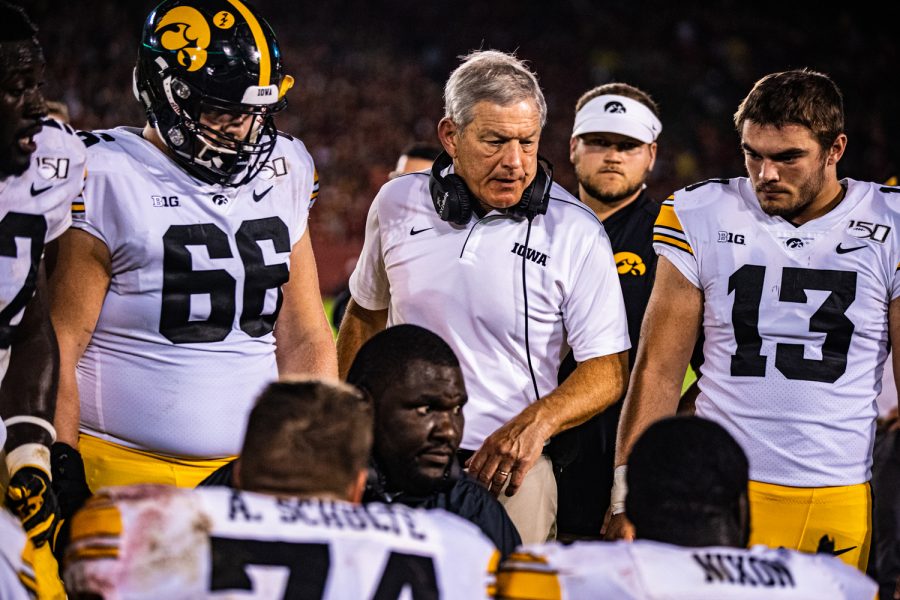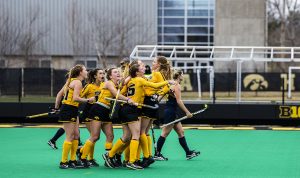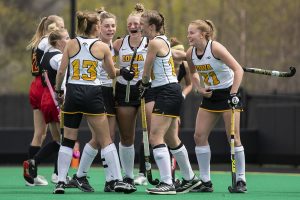Assistant Iowa football coaches address verdict in Chauvin trial, current state of Hawkeye program’s culture
George Floyd’s murder at the hands of former Minneapolis police officer Derek Chauvin last year sparked former Hawkeye players to come forward with allegations of racism they experienced in their time with the Iowa football program.
Iowa head coach Kirk Ferentz and Defensive Line Coach Kelvin Bell talk to the team during a football game between Iowa and Iowa State at Jack Trice Stadium in Ames on Saturday, September 14, 2019. The Hawkeyes retained the Cy-Hawk Trophy for the fifth consecutive year, downing the Cyclones, 18-17.
April 21, 2021
Kelvin Bell felt both a sense of sadness and relief Tuesday afternoon after he was notified via Twitter that former Minneapolis police officer Derek Chauvin was found guilty on all three charges in the murder of George Floyd.
Bell, who is entering his fourth season as the Iowa football team’s defensive line coach, attributed his sadness to “opened old wounds” from last May, when the video of Floyd’s neck being pinned under Chauvin’s knee for more than nine minutes went viral.
As far as Bell’s sense of relief, he tied that to why he felt so nervous before the verdict was read shortly after 4 p.m. Tuesday.
“Even though people saw what they saw on the, I wasn’t one to raise my hand and say it was a slam dunk conviction on that case,” Bell said on a video conference Wednesday afternoon. “I think that goes to show you that even though you can see a man be murdered on camera for the world to see, and for you to still have doubt that the perpetrator would be convicted of murder, that shows you how much further [as a country] we have to go.”
Floyd’s murder sparked one of the largest civil rights movements in decades, with renewed calls for racial justice and the end of police violence being heard nationwide. Those discussions also entered the realm of sports, including in Iowa City.
In the wake of Floyd’s murder, dozens of former Hawkeye football players came forward with the racist and demeaning treatment they alleged to have experienced from coaches in their time with the Iowa program.
At the center of most of these allegations was former strength coach Chris Doyle, who was on the Hawkeye coaching staff for 21 years before reaching a separation agreement with the University of Iowa on June 15 amid the allegations. Head coach Kirk Ferentz and his son, offensive coordinator Brian Ferentz, also faced allegations but were retained by the UI.
A review of the football program completed by the law firm Husch Blackwell last July found that the program’s rules “perpetuated racial or cultural biases and diminished the value of cultural diversity.”
Bell, Brian Ferentz, and Iowa linebackers coach Seth Wallace all addressed the Chauvin verdict and the state of the Hawkeye program during a previously scheduled virtual press conference Wednesday.
RELATED: Local leaders urge continued action after guilty verdict in Chauvin trial
“What I’ve learned more than anything in the last year is sometimes it’s important to listen,” Brian Feretnz said. “We try to have conversations on a daily basis in this program. We’ve tried to be a lot more open within the program and have a lot more dialogue in the last 12 months.”
Doyle, Kirk Ferentz, and Brian Ferentz are among the defendants in a lawsuit filed by 13 Black former Iowa football players in November. These players claim they faced “targeted and discriminatory behavior” in their time with the Iowa football program.
Wallace was not implicated in the allegations of racism, but former offensive tackle Jack Kallenberger accused the coach of bullying.
Last fall, current fifth-year senior Matt Hankins said “anxiety has been lifted off the shoulders of many of us,” after Doyle’s departure. Other players described no longer feeling the need to “walk on eggshells” at the team facility after allegations from former players were made public.
“I think we have a little bit more voice,” Iowa safety Kaevon Merriweather said this spring. Merriweather became the first Iowa player to declare members of the team would kneel for the national anthem last season. “If we see anything that’s going on, or any changes, we’re more confident to go to coaches, and actually talk to them about those issues and see the changes within.”
Wallace said that the team addressed and discussed the Chauvin trial in a meeting Wednesday morning, but did not provide specifics into the conversation. Bell was not at that meeting, as he had a prior obligation to take his child to daycare.
Bell said he plans to discuss the trial with his position group and other players who he may have interactions with. Bell, who is Black, admitted Wednesday that prior to last summer, when players started to open up more about social justice matters, there was a “general unawareness” from white players on the team about how some Black players in the program felt and how matters such as George Floyd’s death impacted them. Bell also said he regrets not having previously shared his thoughts with his players on these matters.
Failing to address that was something Bell called a “failure to educate players.”
“I made a mistake last summer in assuming that my players knew where I stood,” Bell said. “I made a mistake in assuming that I knew where certain players stood based on where they were from and what they looked like. That was a mistake on my part. I’ll never do it again.
“We have open and honest conversations. I’ve really been enlightened by the things our young men have to say. I’m proud of where we are right now. These young people see this as a safe space to be able to share their opinions regardless of if they differ… I don’t take lightly the impact we’re going to have on them.”





